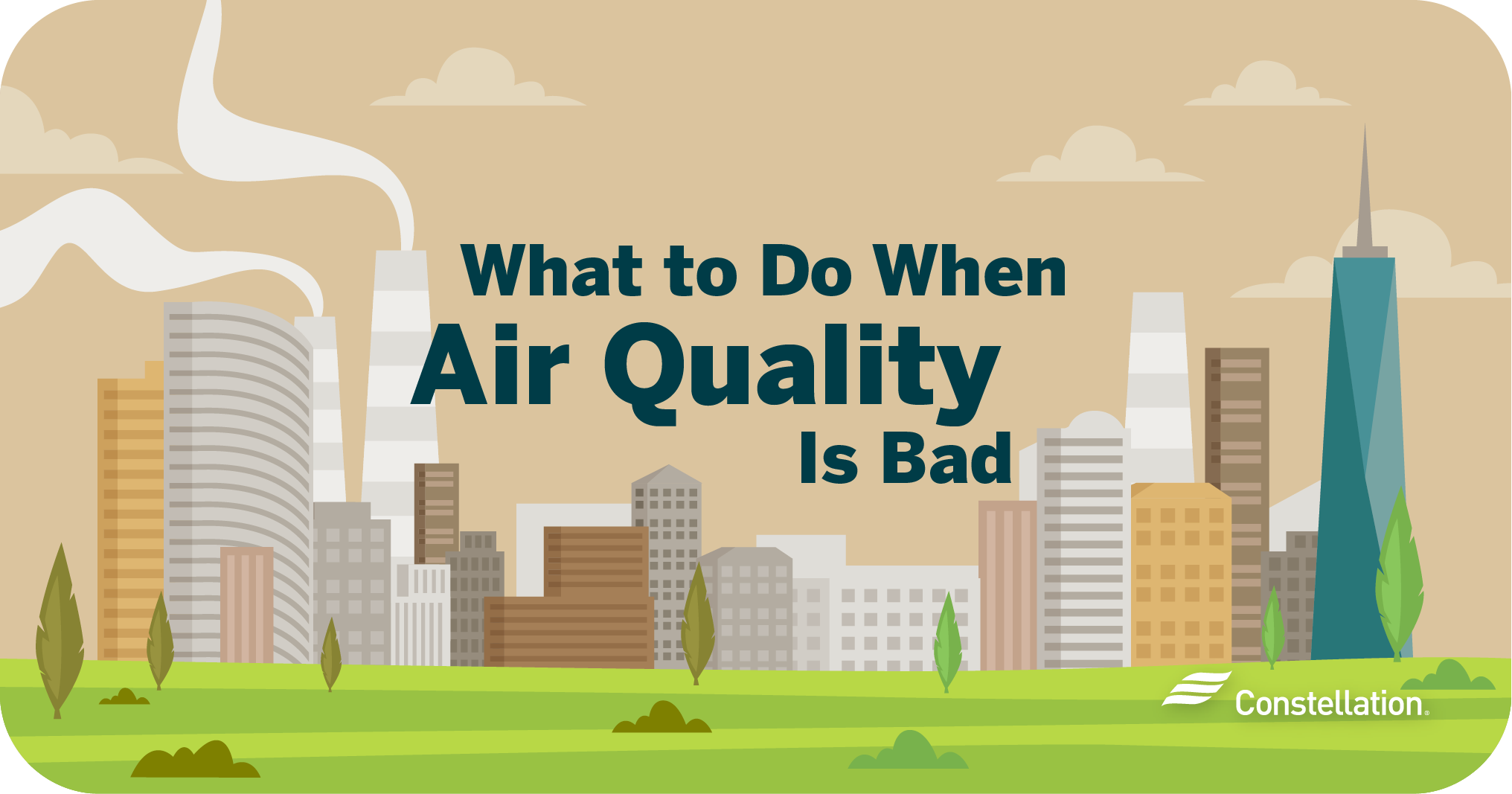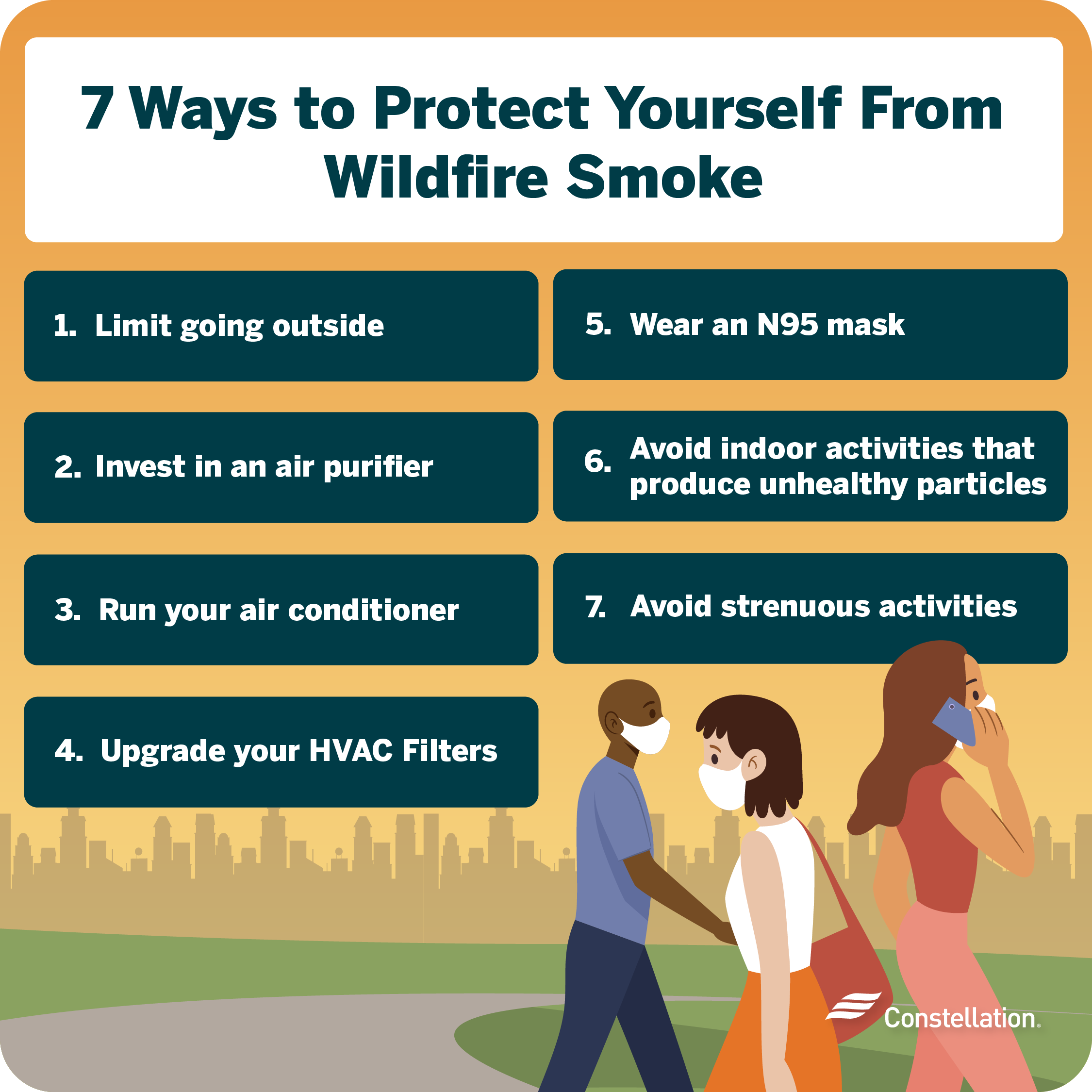
- Category:
Disaster Preparedness -
Last updated:
August 11, 2023
What to Do When Air Quality Is Bad
The frequency of wildfires has surged to unprecedented levels in the last few years, indicating a troubling trend that is quickly becoming the new norm. These significant wildfires, exacerbated by factors such as climate change, are posing severe threats to both people and their surroundings.
Even those who are not directly in the wildfire’s path find themselves grappling with a new concern: the spread of wildfire smoke in the air. As the smoke moves across vast distances, the health hazards associated with breathing in the fine particulate matter and toxic gas have become a worry for communities far beyond the immediate fire zones.
Navigating the impacts of wildfire smoke has left people wondering what actions they can take to protect themselves. From city dwellers to suburban residents, people are seeking guidance on how to protect themselves and their families from the potential health risks caused by inhaling smoke-filled air. By equipping yourself with knowledge and practical strategies, you can be better prepared in the face of this changing environment.
What are the health risks of smoke exposure?
Exposure to wildfire smoke poses significant health risks due to the presence of fine particles, also known as PM2.5. These tiny particles, measuring 2.5 micrometers or smaller in diameter, can penetrate deep into the respiratory system and even enter the bloodstream.
Inhalation of PM2.5 can lead to a range of immediate and long-term health issues. In the short term, individuals may experience respiratory problems such as coughing, wheezing, and difficulty breathing. Those with pre-existing respiratory conditions, like asthma or chronic obstructive pulmonary disease (COPD), are particularly vulnerable, as smoke exposure can worsen their symptoms and lead to more severe health complications.
The harmful effects of wildfire smoke are not limited to the respiratory system alone. Studies have linked prolonged exposure to high levels of smoke to an increased risk of heart attacks and stroke, especially in vulnerable populations such as the elderly and individuals with heart disease. The fine particles and toxic gasses present in the smoke could trigger inflammation and oxidative stress in the cardiovascular system, contributing to the development of cardiovascular problems.
Beyond the immediate physical health risks, smoke exposure may also impact mental health, causing stress and anxiety, particularly for those living in smoke-affected areas and witnessing the destruction caused by wildfires.
Who is at an increased risk?
While wildfire smoke poses health risks to vulnerable populations, it is essential to recognize that the effects extend to all individuals, including generally healthy people. The fine particles in the smoke can irritate the respiratory system and cause temporary discomfort even in those with no pre-existing conditions. Inhaling smoke-filled air can lead to symptoms such as coughing, throat irritation, and shortness of breath, affecting the overall well-being and daily activities of otherwise healthy individuals.
However, certain groups are particularly susceptible to more severe consequences of smoke exposure. Older adults may have reduced lung function and a weakened immune system, making them more vulnerable to respiratory issues and complications. Pregnant individuals are also vulnerable as smoke exposure can potentially harm fetal development. Children, with their developing respiratory systems and higher breathing rates, are at a heightened risk of adverse effects from smoke inhalation.
Additionally, individuals with existing heart or lung conditions, such as asthma, COPD, or cardiovascular disease, may face a significantly higher risk of exacerbating their conditions and experiencing severe health impacts.
How to Know When Air Quality Is Poor
When it comes to knowing the air quality in your area, one of the most reliable sources is the National Weather Service. The NWS provides regular air quality warnings and updates, incorporating data from various environmental monitoring stations across the country to assess air pollution levels accurately. These warnings can be accessed through their official website, social media platforms, or weather apps, making it convenient for individuals to stay informed about the current air quality conditions.
Additionally, local public health agencies play a crucial role in disseminating air quality information to their communities. These agencies often collaborate with environmental departments to measure pollution levels and potential health risks associated with poor air quality. Through their websites, public announcements, and outreach programs, local public health agencies provide essential guidelines and recommendations to protect individuals from the adverse effects of air pollution.
How to Protect Yourself from Wildfire Smoke

Protecting oneself from air pollution is crucial, whether indoors or outdoors. There are several measures individuals can take to improve indoor air quality and limit their exposure while air quality levels are high.
1. Limit going outside
During periods of wildfire smoke, avoid going outside whenever possible to minimize exposure because staying indoors provides a significant barrier against harmful pollutants. To further enhance indoor air quality, it is essential to keep windows and doors shut to prevent smoke from entering. If there are any gaps or air leaks, sealing them can help ensure a tighter seal and reduce smoke infiltration.
To purify the air indoors, using air purifiers with High-Efficiency Particulate Air (HEPA) filters is recommended. These purifiers are effective in capturing and removing fine particles, smoke, and other airborne contaminants, creating a healthier indoor environment. Additionally, avoiding activities that can generate indoor pollution, such as smoking or using candles, can help maintain cleaner air. Hydration is also crucial during wildfire smoke risks, as it can soothe the respiratory system.
2. Invest in an air purifier
The use of HEPA air purifiers is necessary in improving indoor air quality, especially during periods of poor air conditions. HEPA filters are designed to capture and remove airborne particles as small as 0.3 microns with an efficiency of 99%. This includes dust, pollen, pet dander, mold spores, and even fine particles found in wildfire smoke, providing a significant reduction in indoor air pollution.
By using a HEPA air purifier, individuals can create a healthier living environment, particularly for those who suffer from allergies, asthma, or other respiratory conditions, as it helps alleviate symptoms and prevent exacerbation of health issues.
When considering HEPA air purifiers, readers should look for reputable brands known for their high-quality performance. Additionally, it’s crucial to select a purifier that matches the size of the room where it will be used. Larger rooms will require higher capacity purifiers to ensure optimal air purification. Some air purifiers also come with additional features like activated carbon filters to help remove odors and harmful gas.
3. Run your air conditioner
During wildfire smoke, it is generally safe and recommended to run your central air conditioner to help improve indoor air quality. Central AC systems typically do not bring outdoor air inside unless they have a fresh air intake system. If your central AC has a fresh air intake option, it is crucial to close it or switch the system to recirculate mode during smoky conditions. By doing so, you prevent smoke from entering your home and ensure that the air being circulated indoors goes through the filtration system, significantly reducing the levels of airborne pollutants and improving indoor air quality.
However, there are specific considerations for other types of AC systems. If you have an evaporative cooler, it is best to avoid using it during smoky conditions because it can draw more smoke inside, compromising indoor air quality. In such cases, consider alternative cooling options like fans or window air conditioners, which do not bring outdoor air into the living space.
For window air conditioners, it is essential to close the outdoor air damper if possible and ensure a tight seal between the air conditioner and the window to minimize smoke infiltration. Similarly, for portable air conditioners, it is crucial to avoid using single-hose units in smoky conditions as they can bring more smoke from wildfires inside. Instead, opt for fans or window air conditioners. If you have a portable air conditioner with two hoses, ensure a tight seal between the window vent kit and the window to prevent smoke from entering.
4. Upgrade your HVAC filters
If you have a central air and heating system in your home, it is important to regularly change and upgrade your HVAC filters to promote cleaner indoor air quality. HVAC filters play a crucial role in trapping airborne particles, such as dust, pollen, pet dander, mold spores, and even bacteria, that circulate through your HVAC system.
Over time, these filters can become clogged, reducing their effectiveness and potentially leading to poor air quality inside your home. By replacing or upgrading your filters, you ensure that the air circulating throughout your home remains cleaner and healthier to breathe, especially for individuals with allergies or respiratory conditions.
When choosing HVAC filters, pay attention to their Minimum Efficiency Reporting Value (MERV) ratings. Filters with higher MERV ratings are more efficient at capturing smaller particles, making them better at improving indoor air quality. Filters with MERV ratings between 8 and 13 are typically recommended for residential use, as they strike a good balance between filtration efficiency and airflow resistance. However, it’s essential to check your HVAC system’s specifications to ensure that the chosen filter is compatible with the equipment and won’t cause undue strain on the system’s performance.
5. Wear an N95 mask
If avoiding the outdoors while air quality is poor is not possible, it is highly recommended to wear an N95 respirator mask to protect yourself from inhaling harmful particles. N95 masks are specifically designed to filter out at least 95% of airborne particles, including pollutants, dust, smoke, and allergens. These masks create a secure seal around your nose and mouth, ensuring that the air you breathe is filtered and reducing the risk of inhaling harmful substances.
6. Avoid activities that create more fine particles indoors
Engaging in activities indoors that produce unhealthy particles can significantly deteriorate indoor air quality and harm respiratory health. Activities like these should be avoided:
- Smoking cigarettes. Burning cigarettes release numerous harmful chemicals and particulate matter into the air, posing a serious health risk not only to the smoker but also to anyone exposed to secondhand smoke.
- Using gas, propane, or wood-burning stoves. These types of stoves and furnaces release pollutants like carbon monoxide and fine particles that can cause respiratory issues and exacerbate existing conditions.
- Spraying aerosol products. Aerosol products, such as air fresheners, hair sprays, and cleaning agents, contain volatile organic compounds (VOCs) and fine particles that can worsen indoor air quality.
- Frying or broiling food. This method of cooking generates fumes that can release particulate matter and lead to indoor air pollution.
- Burning candles or incense. The smoke that’s emitted from candles and incense contains soot and other particles that may irritate the respiratory system.
- Vacuuming without a HEPA filter. This can stir up dust and allergens, redistributing them into the air and making breathing difficult for sensitive individuals.
7. Avoid strenuous activities
To safeguard respiratory health, individuals should avoid engaging in strenuous activities, both indoors and outdoors, when there is significant smoke in the air. Smoke, particularly from sources like wildfires, contains numerous particles and chemicals that can deeply impact the respiratory system when inhaled. During strenuous activities, such as vigorous exercise, heavy breathing occurs, leading to a higher intake of polluted air and exacerbated respiratory issues.
Limiting physical exertion when smoke levels are high is crucial for vulnerable groups, including children, the elderly, and individuals with pre-existing respiratory conditions such as asthma or chronic obstructive pulmonary disease (COPD). It’s essential to stay updated on air quality levels in your area and avoid outdoor exercise when smoke concentrations are elevated. Even indoors if the air quality is compromised due to smoke infiltration.
Wildfire Smoke Air Quality FAQs
Air quality is a critical factor that can significantly impact our respiratory health and overall well-being. Whether it’s smoke from wildfires, air pollution, or indoor sources, inhaling these harmful particles can lead to a range of health issues, particularly for vulnerable individuals. To protect ourselves further, read up on these commonly asked questions to stay informed about air quality.
Does wearing a mask help with poor air quality?
Yes, wearing a mask can help with poor air quality to some extent. Masks, particularly N95 respirators, can filter out fine particles and pollutants from smoke in the air, reducing the amount of harmful substances that the wearer inhales. They are effective in capturing airborne particles, such as dust, smoke, and allergens, and can be especially beneficial during times of high air pollution, wildfires, or other situations where air quality is compromised. However, masks do not provide complete protection against all pollutants.
Should I stay inside during an air quality alert?
Yes, it is advisable to stay indoors and limit outdoor activities during an air quality alert. Air quality alerts are issued when the concentration of pollutants in the air reaches levels that can be harmful to health, particularly for sensitive groups like children, the elderly, and individuals with respiratory or cardiovascular conditions. Staying indoors during an air quality alert helps reduce your exposure to harmful pollutants and minimizes the risk of respiratory issues and other health problems.
Keep windows and doors closed to prevent outdoor air from entering your home and consider using air purifiers to improve indoor air quality. If you need to go outside, wearing an N95 respirator can offer additional protection from inhaling harmful particles.
Can I use my AC when air quality is bad?
Using an air conditioner can be helpful during times of bad air quality, but there are certain considerations to keep in mind. Air conditioners can help improve indoor air quality by filtering out some airborne pollutants when they have good-quality filters installed. However, not all air conditioners are equipped with highly efficient filters, and some may not effectively capture very fine particles or pollutants from smoke.
If you plan to use your AC during poor air quality conditions, ensure that your AC unit has a good-quality filter, preferably a High-Efficiency Particulate Air (HEPA) filter which is designed to capture a wide range of airborne particles. Additionally, make sure your AC unit is well-maintained and regularly cleaned to prevent the recirculation of dust and pollutants.
Can I use my window AC during wildfire smoke?
Using a window air conditioner during wildfire smoke can provide some relief by helping to filter the air indoors, but it’s important to take certain precautions and consider the effectiveness of the AC unit’s filtration system.
If your window AC is equipped with a high-quality filter, such as a HEPA filter, it can help reduce the amount of smoke and airborne particles entering your home. However, standard window AC units may not have filters that are efficient enough to capture very fine particulate matter present in wildfire smoke. In such cases, the AC may not offer significant protection against the smallest and most harmful particles.
Should I close my windows during air quality alerts?
Yes, it is generally a good idea to close your windows during air quality alerts, especially when the outdoor smoke air quality is poor.
Closing your windows helps to prevent outdoor pollutants from entering your home and ensures that you are breathing cleaner indoor air. Indoor air can be significantly less polluted than outdoor air, especially if you have good ventilation and filtration systems in place.




